Reviews
Okasan
Mikio Naruse
Japan, 1952
Credits
Review by Ian Johnston
Posted on 28 November 2007
Source VHS
Categories Flowing: The Films of Mikio Naruse
With the attention critics give to the stand-out films of his career (Floating Clouds, The Sound of the Mountain, Late Chrysanthemums, and so forth) and the now firm status that has been granted him as one of the great auteurs of Japanese cinema, it’s easy to forget that Naruse was at heart a faithful company man, gracefully accepting the assignments handed to him by the studio, regardless of how the subject matter and screenplays might or might not be congenial to him. Even in the case of material that he was actively interested in - such as the novels of Fumiko Hayashi, which he first thought of adapting in the 1930s - the initial inception could just as well come from the studio and his involvement as director coincidental (e.g. Repast). In the case of Mother, in spite of its fame we are dealing with a decidedly minor work. The source material and the final result are not quite worthy of Naruse at his peak and in this respect it does seem surprising - another aspect to the vagaries of Naruse’s reception history - that Mother was one of the very few of his films released on video in the U.S. in the pre-DVD age.
The source material is pretty unpromising. The film is based on a prize-winning entry in a school essay-writing competition and this is no doubt the source for the intermittent voice-over narration/commentary from Toshiko, the older daughter (already a young woman) of the family. To be honest, Naruse is not really consistent about this, and although the film repeatedly returns to Toshiko as the important linking thread of the narrative and it ends on her voiceover paean to her mother, the story is not exclusively told from Toshiko’s perspective. We are privy to scenes that Toshiko is not present at and may not even know of (for example, what her younger sister Chako does with her picture of her mother when she moves to live with the relatives who adopt her). But the school essay source of Mother’s screenplay does explain the unevenness of tone, the at times over-explicitness, and a certain sentimentality that you don’t get in other Naruse films of the time. It also lacks those films’ steady flow and balanced calibration of scene to scene. Mother does have its virtues, but it’s by no means the masterpiece you’ll find some critics refer to it as.
The story is of the Fukuhara family, slightly impoverished, struggling to re-establish themselves in post-War Japan. The setting is the early fifties but the legacy of the war hangs heavily: one character has been repatriated from Manchuria, another released from a Soviet P.O.W. camp in the course of the film, and the Fukuharas are suffering from the loss of their laundry business, burned down in the war. Mother Masako is the central force of the film, played by the inimitable Kinuyo Tanaka as devoted, self-sacrificing, resourceful, uncomplaining (her moment of despair will be outside in the courtyard, hidden from everyone), and persevering in spite of all the vicissitudes that befall her and which, we’re convinced in the final scene, will continue to befall her.
Living with her at the start of the film is her husband Ryosuke, reduced to working as a factory guard (just as his wife and elder daughter are to running street food stalls) while the family works at starting up their laundry business again; sickly son Susumu, made sick by his exposure to dust in an upholstery store and soon to be sent by the family to a sanatorium, which he will run away from, such is his longing for his mother; elder daughter Toshiko, the film’s intermittent narrator, a young woman forced to drop out of dressmaking school to help with the family’s finances; young pre-teen daughter Chako; and equally young boy cousin Tetsuo, taken in by the Fukuharas after Masako’s sister returns from Manchuria and while she tries to learn the hairdressing trade.
Family is important in this film, which is framed by two scenes showing the family as an effective unit in its life together. The earlier scene is a celebration of family life with its depiction of the family members gathered around the table and its highlighting of little details, such as the father’s satisfaction as he snacks on his favourite dried bean dish or the interplay between the father and Tetsuo. The final scene is more melancholic but still celebrates a moment of togetherness among what is left of the family as Masako plays with Tetsuo and Toshiko looks on, eulogising her mother in voiceover. Through the course of the film, while the economic fortunes of the family improve with the re-establishment of the laundry business, so that Masako and Toshiko can give up their unrewarding street stalls, Masako’s experience is one of increasing loss and loneliness. First, Susumu dies after escaping home from the sanatorium. Then, Ryosuke dies, seemingly from a combination of overwork and his refusal to run the expense of a stay in hospital. Financial pressures see young Chako adopted out to a now childless member of the family. Masako loses what appears to be her one chance of a new relationship when Mr Kimura, her husband’s fellow-apprentice and assistant in the laundry business, moves away. And the end of the film finds Masako about to be abandoned by the two remaining members of her family—Tetsuo is to go back to his mother, and, although it’s not explicitly stated, Toshiko’s own marriage is clearly in the offing.
On the surface this sounds unrelentingly grim but in fact this is hardly the final effect, for the film is leavened with large doses of humour. Humour is never entirely absent from Naruse’s films of the fifties but it has to be said that his best work of the time has a persistent (but still beautiful) sombreness to it. Mother works in a very different way. For one thing, the comedy comes in large blocks, whole sequences of a lighter tone which, while charming in themselves, work to defuse the more solemn, grimmer elements that have come before. So, the scenes of the father’s sickness and the mother’s despair are followed by the sequence of the festival performance with its good-humoured delight in the charming amateurism on display—such as Shinjiro’s (he’s Toshiko’s boyfriend-in-the-making) performance of “Que bella donna” which leaves his father wincing in embarrassment. Then, in the sad aftermath of the father’s death, with money troubles weighing on Masako and her facing the prospect of adopting out her youngest child, there’s a complete shift in tone as we follow Shinjiro in the family bakery preparing for what he thinks is a solo picnic date with Toshiko, only to have the two young kids turn up as well, leaving him anxiously counting his money on the bus. And again, the sadness and emotional force of Chako’s departure are followed by a lengthy comic sequence where Toshiko’s aunt practises her hairdressing skills on her by dressing her up as a bride, and Shinjiro catches sight of her like this and goes into a panic, collapsing on the bakery floor with a cry of “It’s too late! It’s too late!”
The propensity for Naruse to elide important, even dramatic turns in a story has been much admired, and in Mother, amongst other examples, there’s a particularly striking one. The death of the only son Susumu is never shown: in one scene Susumu is telling his mother he escaped from the sanatorium because “I wanted to be with you”, in the next she’s thanking a former fellow-vendor for her obituary gift. There’s an admirable modesty and restraint here, a refusal to milk the maudlin and sentimental aspects of the story, and Naruse’s overall style compares favourably with other similarly themed films of the time. Keisuke Kinoshita for example (admittedly a very uneven and far lesser figure than Naruse) tackles in Tragedy of Japan/A Japanese Tragedy another story of a mother’s self-sacrifice and struggle to support her family in the post-War period. In essence it’s a harsher and more bitter film than Mother - the mother, forced into prostitution to support her two children, is abandoned by them once they grow up - but its effect in the end is less through Kinoshita’s hectoring, mishmash of styles.
Still, this elision of Susumu’s death at the same time spares the audience the pain this scene would otherwise entail, makes it palatable to a mass audience in the same way that the lengthy comic sequences dilute the impact of the increasing sadness of each stage of Masako’s life. Mother never quite carries through on what its story really entails. Even Toshiko’s petulant cruelty towards her mother, her childish jealousy towards Mr Kimura as a potential substitute for her late father and her deliberate spoiling of any chances the two may have together, is apparently forgotten in the way the film ends on her excessively sentimental outcry: “Mama! My dearest Mama! Are you happy? Oh, how anxious I am to know. Mama! My dearest Mama! Live long! Oh, live long - forever - forever!” In this explicit excess of emotion, we miss Naruse’s characteristic delicacy of touch, the way in the best of his films - unlike here - he allows the emotional situation to seep and flow into us, ultimately to far greater effect.
More Flowing: The Films of Mikio Naruse
-
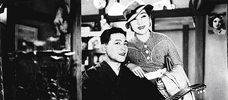
Wife! Be Like a Rose!
1935 -
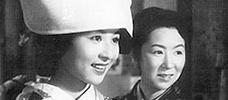
Mother
1952 -
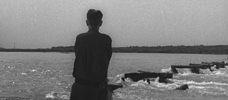
Older Brother, Younger Sister
1953 -
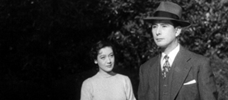
The Sound of the Mountain
1954 -

Floating Clouds
1955 -
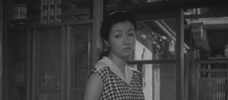
Flowing
1956 -

Summer Clouds
1958 -
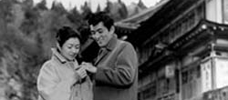
Yearning
1964 -
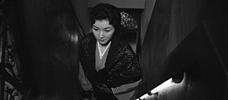
When a Woman Ascends the Stairs
1960 -
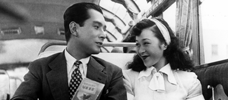
Repast
1951
We don’t do comments anymore, but you may contact us here or find us on Twitter or Facebook.



